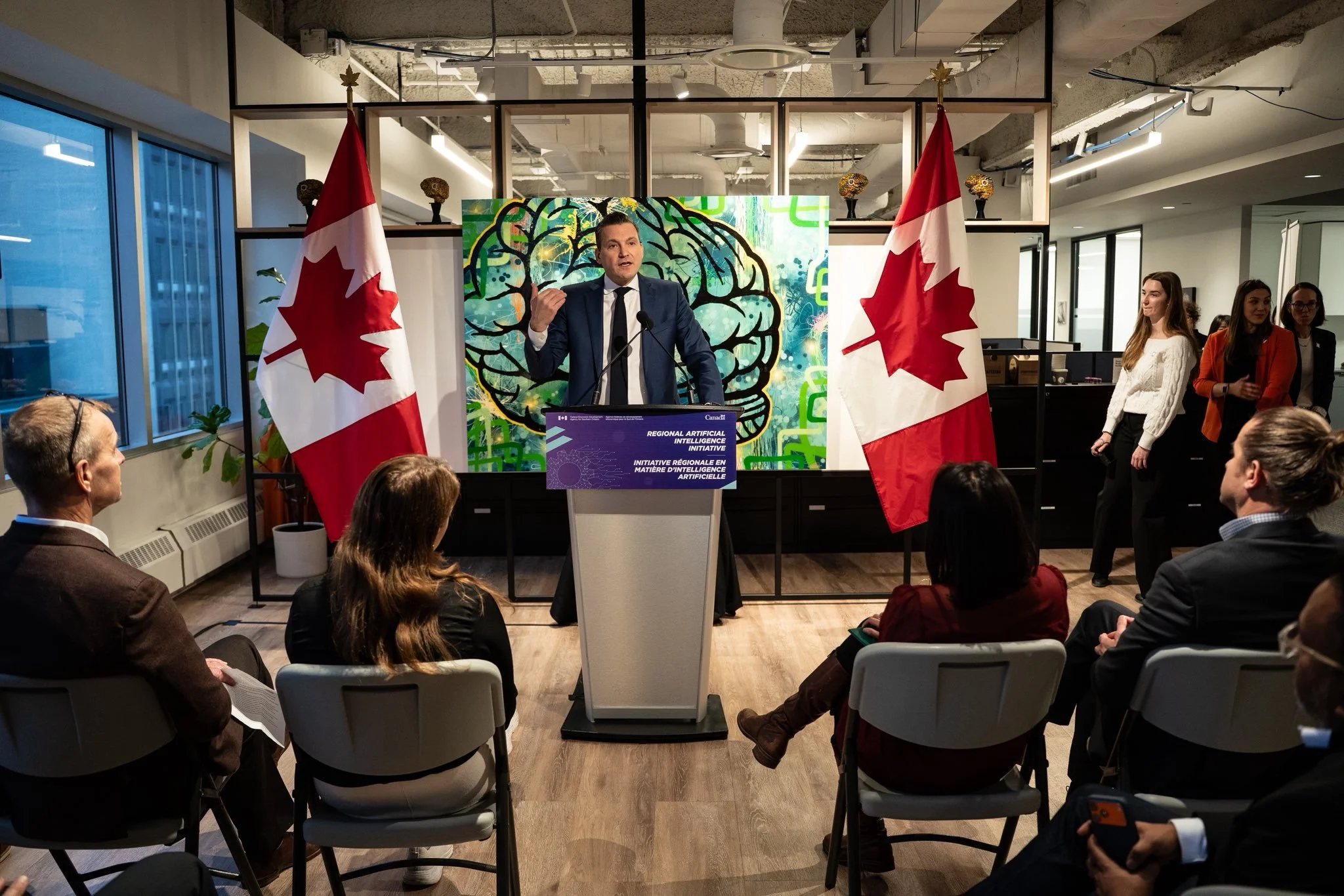Ottawa is betting big on AI – we must get it right at this pivotal moment
Artificial Intelligence and Digital Innovation Minister Evan Solomon spoke at the Empire Club today and announced a new task force on AI. ‘Their job is to strengthen digital sovereignty, scale Canadian AI, and build public trust—so innovation serves people. Sovereignty isn’t solitude—it’s our foundation to partner on our terms,’ he wrote on social media. / TWITTER PHOTO
Canadians are currently living in a transformational “Gutenberg moment” in which we either succeed as a country or languish, says Artificial Intelligence and Digital Innovation Minister Evan Solomon.
At this time of “technological revolution colliding with a political realignment,” the federal government is positioning itself to respond to profound changes in technology, economics and governance as it relates to AI, the minister says.
“The choices that we make today will shape our economy and our democracy, our daily lives and our values for decades to come,” he said in an address to the Empire Club of Canada Friday. This means “we need a meaningful Canadian sovereign backbone … the people, the power and the compute to build a digital economy that is free from coercion and acts under Canadian law that someone else cannot turn off.”
There’s no doubt that we must get it right.
Solomon’s plan, unveiled at the All In AI Event this week, includes updating Canada’s privacy and data protection laws for the first time in over 25 years, expanding sovereign cloud capacity and fast-tracking a new national AI strategy. He described the agenda as both economic policy and a democratic safeguard, built around digital sovereignty.
The government’s proposals are wide-ranging: new protections against deepfakes, stronger safeguards for children, clearer rules around personal data and reforms to support Canadian AI companies with “capital, customers, compute.”
Productivity ‘emergency’
In addition to responding to the new geopolitical world order brought on by the U.S., the urgency stems from Canada’s persistent productivity challenge. Output per worker has flatlined for nearly a decade, prompting Bank of Canada deputy governor Carolyn Rogers to call it an emergency: “It’s time to break the glass. We’re not making the investments we need to be competitive in the economy of the future,” she said.
Deloitte estimates that widespread AI adoption could boost Canada’s GDP by 5–8% over the next decade, driving annual productivity growth of 0.5–0.7%. Yet those gains depend on adoption — and here Canada lags. Only 26% of Canadian organizations have implemented AI, compared to 34% globally. Canada’s position in the Global AI Index has slipped from 4th in 2021 to 8th in 2024.
That gap between research strength and business deployment looms large. Canada is home to global AI pioneers Geoffrey Hinton and Yoshua Bengio, and clusters of startups in Toronto, Montreal and Vancouver. But Deloitte warns that commercialization of AI applications remains challenging. Canadian firms spend less on R&D than peers, and scaling remains a barrier.
Solomon is promising “new tools” to help entrepreneurs scale their companies, incentivize investment and keep their headquarters in Canada, but he has not revealed details. He also said the federal government will use procurement to create “markets for Canadian-made AI solutions.”
The Empire Club audience applauded when he noted: “We need to make sure that the headquarters, the jobs and the IP stay here at home — Canada as the AI head office and not as the plant branch nation.”
The government announced an AI task force to help with recommendations on how to do just that. He’s given them one month to do so to avoid talking ideas “to death.” The task force will also look at improving research, talent, adoption and marketing of AI in this country, Solomon said earlier this week. “They’re going to deliver bold, practical ideas that move quickly from paper to practice.”
The question is whether the government can follow suit and implement those recommendations just as quickly. The proof will be in the pudding.
Below-average trust
On the consumer side, adoption is more rapid. A recent Leger poll found 57% of Canadian adults have tried an AI tool, up 10 points in a few months; among those aged 18–34, the figure is 83%. Nearly half of users believe AI can improve workplace productivity. Yet unease persists: more than 80% of Canadians worry AI threatens jobs, and Deloitte reports that trust in AI is 19 points lower than the global average, with only 31% of Canadians saying they trust it.
Solomon’s roadmap seeks to bridge that “gap between innovation and trust.” “Technology moves at the speed of innovation, but adoption moves at the speed of trust,” he said.
Solomon said sovereign cloud will ensure that sensitive government health, financial, personal and security data is stored under Canadian jurisdiction. He described a potential three-tier system incorporating highly secure sovereign cloud for critical and government data, hybrid models with safeguards such as two-key security and public cloud for non-sensitive uses.
When asked about U.S. laws such as the Cloud Act, which allow American agencies to access servers abroad, Solomon said sovereignty requires Canadian-owned infrastructure and technical solutions to prevent “back door” access. “Sensitive data must be subject to Canadian law,” he said.
Adoption challenge
Looking ahead, Ottawa promises a national quantum initiative in October, an AI Task Force report in November and a new national AI strategy by year’s end. The minister emphasized the stakes: “Data is king. Whoever controls it, whoever uses it, whoever governs it will determine our collective prosperity and our security. We cannot miss this innovation train.”
At this “hinge moment,” Canada faces both opportunity and risk. With strong research, rising consumer use, and ambitious government plans, the potential for AI is significant. But the productivity gap, adoption lag, and trust deficit remain pressing challenges. The government has set ambitious goals; the task now is to translate them into concrete action that secures both opportunity and protection in the digital era.
EDITOR’S NOTE: The impacts of AI on various economic sectors are important to look at during this transformational time. Our mission is to dive deeply into the world where business intersects with politics — offering fresh takes on policies that affect consumers, business and the national economy. That’s why Means & Ways is planning a new series that investigates how AI is affecting Canadians in all walks of life.
Starting next week, we will explore how this tech revolution plays out for youth employment, where young people are entering a rapidly changing job market; rural Canada, where adoption is slower and infrastructure more fragile; climate change, where AI offers both powerful tools and serious trade-offs; and more. Stay tuned!
Do you have a unique vantage point on AI and its impacts on Canada’s economy?
We want to hear from you! What should the government be doing to spur business innovation? Can Canada adopt AI quickly enough to compete meaningfully globally? How can we get digital sovereignty right? What are the ‘bold, practical ideas’ that will increase productivity?
Reach out with your solutions: news@meansandways.ca.





